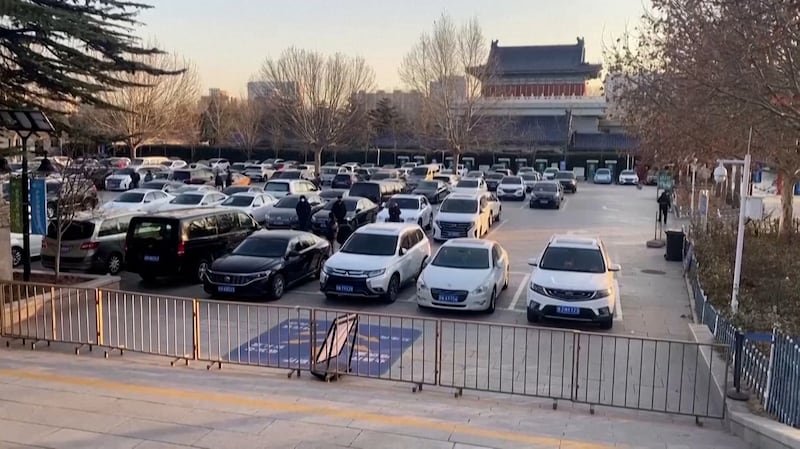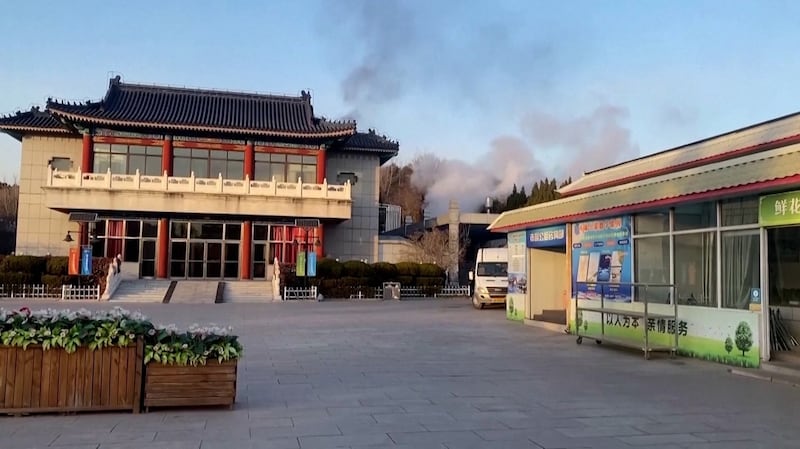UPDATED AT 4:02 p.m. ET ON 12-19-2022
Beijing is currently facing an extraordinary wave of deaths as COVID-19 rips through the population, amid a widespread lack of data as mass, compulsory testing is abruptly halted across the country, residents and officials told Radio Free Asia.
As China moves away from the grueling lockdowns, mass tracking of citizens and daily testing that characterized Communist Party leader Xi Jinping's zero-COVID policy, a high-ranking official in the party's law enforcement arm said that a family member of his had died recently, and the family had had to wait five days before they could find a cremation slot.
The person, who asked to remain anonymous for fear of reprisals, said he had only been able to get a cremation that fast due to his rank and connections within the Chinese political system.
According to the person, who works in the Communist Party's political and legal affairs system, which directs and governs law enforcement across the country, the current wave of COVID-19 infections in Beijing was driven by transmissions in hospitals, known as nosocomial infections.
"A relative of mine had been recuperating in hospital [from something else], but the hospitals back then basically weren't discharging anyone, because the 20th Party Congress was on at the time, and they said it was because they feared having them test positive once they got out," the person said.
"Actually, the virus was already ripping through the hospital by then ... and they weren't allowing anyone to report these cases to higher levels of government," he said. "Also, they weren't allowing COVID-19 to be treated as such, just describing it as a ‘fever' in patients' notes."
"My relative was being treated for a so-called urinary tract infection ... They did a test for COVID-19 only because my family has some influence, and it came back positive," he said.
It was only after the announcement that late Communist Party leader Jiang Zemin had died that the authorities began allowing news of the outbreak to filter through to the outside world. On Monday, China officially announced its first two COVID-related deaths since the end of the zero-COVID policy, but the Communist Party official's account and reports by eyewitnesses suggest the number may be higher.
He described "appalling" scenes inside a number of Beijing hospitals, as the city's healthcare system groaned under the weight of the outbreak, with most of the victims elderly people.
"We started out at a fairly good private hospital, then we went to Tiantan Hospital, and to Ditan Hospital after that," he said. "In all of these hospitals, we saw that the deaths were of elderly people who had been infected with COVID-19 both before and after the relaxation [of the zero-COVID policy]."
"What we saw was really appalling," he said. "All of the hospital morgues were full, and they were stacking dead bodies on the ground, on top of each other."
"If you call any funeral home in Beijing right now ... they will tell you that they have nowhere to store any more bodies and that you'll have to wait a week or longer [for a cremation]," he said.

‘Cremating 180 people a day’
Of 12 funeral parlors contacted by phone on Monday, only two picked up, while the rest returned a busy signal.
An employee who answered the phone at the Mentougou Funeral Home in a northwestern suburb of Beijing said they were currently dealing with five times the usual number of cremations.
"There is no space here ... our cold storage is full and there is nowhere to put [any more bodies]," the employee said. "We only have three or four furnaces and we're cremating 180 people a day."
They said they are now taking bookings for cremations from Dec. 31 at the earliest.
An employee who answered the phone at a funeral parlor in Beijing's Fangshan district said they're no longer taking bookings at all.
"I can't book you in, and we can't even pick up and transport [bodies] across districts right now," the employee said. "You'll need to look at other funeral homes."
Meanwhile, a notice issued by a funeral parlor in Tongzhou district said they were only taking bookings from people whose household registrations were in that district, and that the measures had been in place since Dec. 10.
The official in the Communist Party's political and legal affairs system said the wave of deaths was likely of people infected before restrictions were lifted.
Data released by researchers at Harvard School of Public Health showed that COVID-19 deaths in 2020 -- when many people in the United States were still unvaccinated, as many older people in China are now -- often occurred from two to eight weeks after the onset of COVID-19 symptoms.
An official who answered the phone at the Beijing civil affairs bureau declined to comment on the number of deaths and cremations in Beijing in recent weeks, citing a lack of data.
Repeated calls to the Beijing municipal health commission rang unanswered during office hours on Monday.

‘Most of them are positive’
Radio Free Asia reported last week that funeral parlors were working round the clock to try to keep up with the current wave of deaths, suggesting that the COVID-19 wave underlying the deaths could have started as early as nine weeks ago.
There was also anecdotal evidence that COVID-19 is still ripping through the city’s population at large, with political commentators and Beijing residents alike estimating that the majority of the people they know currently have it.
“Most of them are positive,” political commentator Ji Feng said of his circle of acquaintances in an interview on Monday. “I have serious suspicions that there is something wrong with [Chinese-made] vaccines.”
“Around 60-70% of the young and middle-aged people I know have basically tested positive,” Ji said.
A resident of Fangshan district surnamed Tang said around 80% of her apartment building had recently tested positive.
“A lot of people tested positive, but they’ve recovered now, and I’m the only one who is still positive,” she said.
A resident surnamed Ma said many people are staying home, with not many people on the streets.
“A conservative estimate among people I know would be about 70-80% positive – no one can escape this virus now; it’s so contagious,” Ma said. “Shops are closed … and people are basically staying home.”
First deaths reported
China's National Health Commission on Monday reported its first deaths from COVID-19 since the end of the zero-COVID restrictions earlier this month. The two deaths were the first to be reported by the NHC since Dec. 3, days before announcement that the policy had been abandoned.
Reuters news agency reported that one of its journalists in Beijing on Saturday saw "hearses bearing dead lining the driveway to a designated COVID-19 crematorium" with around 20 body bags containing corpses on the floor of an adjacent funeral home, although it was unable to confirm whether the deaths were due to COVID.
China says it has only suffered 5,237 COVID-related deaths during the pandemic, including Monday's deaths -- a number seen as extremely low, considering its population of 1.4 billion people and compared to global standards. Authorities have also stopped reporting asymptomatic cases as of last week, citing a drop in mandatory testing since the end of the zero-COVID policy. Observers have expressed concern that the latest numbers fail to show the severity of the current outbreak.
Speaking during a press briefing on Monday, U.S. State Department spokesperson Ned Price said that Washington wants Beijing to contain the spread of COVID in China to avoid a mutation of the virus and to prevent any global economic fallout.
"We know that anytime the virus is spreading, that it is in the wild that it has the potential to mutate and to pose a threat to people everywhere. We've seen that over the course of many different permutations of this virus, and certainly [that's] another reason why we are so focused on helping countries around the world address COVID, another reason why bringing this to a close in China would be beneficial," he said.
"The toll of the virus is of concern to the rest of the world, given the size of China's GDP, given the size of China's economy. It's not only good for China to be in a stronger position vis-à-vis COVID, but it's good for the rest of the world as well."
Translated by Luisetta Mudie .
This story has been updated to include latest COVID numbers in China and U.S. State Department reaction to current outbreak.

